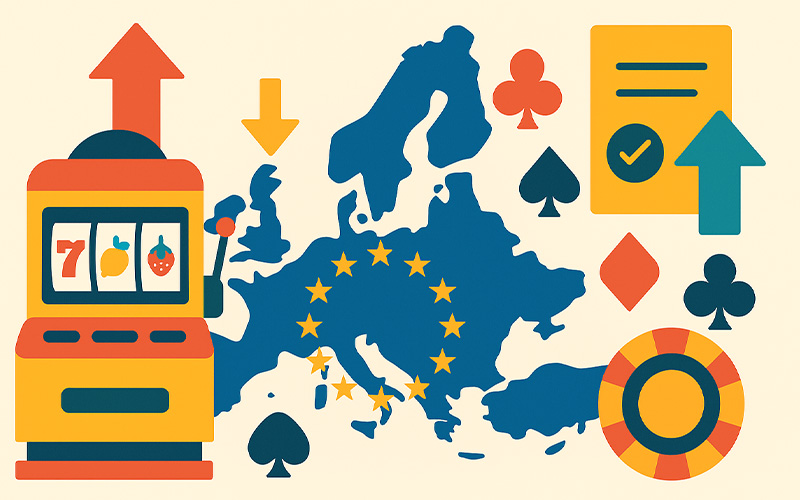2026 iGaming in Europe: Clampdown, Costs, and New Rulings
The EU has presented some serious online gambling changes this year. What initially appeared to be a series of isolated tweaks has evolved into a clear pivot toward tighter oversight and stricter rules. The post-pandemic surge in online activity drew a sharper gaze to player protection and responsible gambling, and now the response has arrived a hundredfold.
For businesses, this is not a routine compliance cycle. Cost structures swell, lifetime value forecasts fall, and long-trusted acquisition routes either shrink or stop making sense financially. Operators feel the squeeze on margins and product design, while media-buying teams discover that once-reliable campaigns no longer pass legal frameworks.

The consequences are uneven across borders, but the direction is unmistakable. Some markets impose hard spend ceilings, others lift monopolies, yet keep a firm hand on conduct. In this climate, survival hinges on expertise, discipline, and a new commercial playbook.
Why There Is No Single EU Licence
The reason there is no pan-European permit for iGaming is due to the specifics of the law. Under the Treaty on the Functioning of the European Union, each member state sets its own rules for gambling. Brussels can establish horizontal standards, such as data protection and anti-money laundering, but it does not prescribe how casinos and sportsbooks must operate on a day-to-day basis.
This autonomy produced a mosaic of regimes. Some countries rely on state monopolies with little room for private brands. Others allow open licensing with strict supervision and dense rulebooks. There are also hybrid paths where an online permit depends on a partnership with a land-based venue. The result is a landscape that rewards local fluency and punishes generic rollout plans.
For companies, fragmentation raises the bar. Compliance teams must track separate tax models, different responsible-gaming measures, and incompatible advertising codes. Payment flows, KYC steps, and bonus mechanics vary widely. A template built for one jurisdiction rarely travels without rework.
Country-by-Country 2026 Changes
Europe’s regulatory weather is turning colder in most places, but each jurisdiction applies its own logic. Operators have to be aware of the hottest spots and what their rule changes mean in practice.
Germany
The country puts player protection at the centre of its model, and that choice reshapes profitability. A universal monthly deposit ceiling of €1,000 applies to every licensed brand, which compresses peak spend across the ecosystem.
The GGL also leans on IP and payment blocking to deter unlicensed play. This makes grey-market acquisition far harder. Economics feels the pinch from both a 5.3% stake tax on slots and poker, as well as the €1 per-spin cap that flattens volatility.
United Kingdom
Local policy ties industry gains to harm-reduction funding and tighter slot controls. A statutory levy of up to 1% of GGY now finances research, prevention, and treatment programmes.
Slot stakes are capped at £5 for players aged 25+ and £2 for those 18–24, reducing high-velocity play. The UKGC extends scrutiny to B2B suppliers to prevent distribution into unlawful markets, thereby shifting accountability across the supply chain.
Italy
Scale and technology become entry requirements in practice. A nine-year approval carries a €7,000,000 fee, coupled with around 25% GGR taxation.
Operators must also deploy AI-driven compliance tooling, which raises fixed costs and benefits well-capitalized groups capable of building robust monitoring stacks.
Netherlands
The Dutch framework targets net deficit rather than deposits, which changes player trajectories. Monthly loss ceilings sit at €350 for 18–24 and €700 for 25+, which reduces the headroom that VIP cohorts once provided.
A 29% GGR tax layer is imposed on top. This compresses margins and forces recalculation of lifetime value curves.
Finland
Helsinki breaks with the tightening trend as it dismantles the Veikkaus monopoly. An open licensing regime is slated for 1 January 2026 to invite international brands into a market long closed to private competition.
Expectations around conduct and safer gambling remain Nordic-strict. At the same time, the commercial door finally opens.
Sweden
The system stays liberal in structure as it refines the funding rules. The ban on credit cards for gambling now extends fully to online deposits, which cools impulse transactions and raises friction at checkout.
The 18% GGR rate remains unchanged. This maintains tax predictability and clarity for all existing and potential market participants.
Malta
MGA’s appeal faces pressure from EU action against “Bill 55.” If protections that help licensees resist foreign civil claims are rolled back, operators could face a surge of lawsuits and substantial liabilities. Strategic and legal planning must assume a less insulated landscape.
The Rest of Europe
Even outside the headline markets, 2026 brings meaningful shifts that shape the general atmosphere. Before expansion is planned, teams should study the baseline in each jurisdiction.
Here are the essentials of some other destinations:
- France remains closed to online casinos, while betting, poker, and horse racing continue to operate within legal bounds.
- Spain keeps a mature regime with a 20% GGR tax and strict advertising limits, including no off-site promotion of welcome bonuses and no use of celebrities or influencers.
- Austria and Hungary maintain state-heavy models that leave no room for private online operators.
- Belgium preserves its hybrid rule that ties a digital licence to a partnership with a land-based casino.
- Ireland and Bulgaria are comparatively open to recognising other EU approvals, which often reduces the need for a costly standalone local licence.
Operators’ Profit and Loss

In 2026, margins substantially change under a heavier rulebook and stricter play controls. The forecast becomes more challenging as ceilings on spending and tighter controls shift how value accumulates over time.
Where the money can leak and what has to change:
- Compliance inflation rises. Legal support, monitoring platforms, audit trails, and safer-gambling tooling become fixed costs that increase quarter after quarter. The breakeven point moves further out for new launches.
- Per-user revenue is capped by design. Deposit, loss, and stake limits compress the upside that once came from a small set of big spenders. VIP curves flatten and force products to rely on broader mid-tier engagement.
- Acquisition routes narrow. Advertising codes, payment restrictions, and stricter KYC add friction before the first deposit. CAC rises while first-time conversion softens, which breaks older payback models.
- Bonus logic loses power. Lower maximums and stricter wagering rules reduce the impact of headline offers. Value must shift towards long-term utilities, such as speed, stability, and content breadth.
- Tax and fees compound. GGR and stake taxes, licence charges, and levies stack together and squeeze contribution margins. Portfolio planning must prioritise markets where net take-home remains defensible.
- Retention becomes the profit engine. With acquisition pricier and ARPU flatter, income depends on session frequency, churn control, and smart reactivation. Lifecycle CRM and product personalisation stop being nice-to-haves and become core economics.
While the rulebook is heavier, the game is not over. Operators that adapt their models can still protect margins and keep growth alive. The priority is to rebuild economics around steadier engagement, stronger trust, and predictable paybacks.
A clear path to start reshaping the business:
- Diversify beyond one strict GEO. Spread exposure across several regulated markets and add products with softer controls where possible, such as sports betting, when casino limits bite. A broader base cushions shocks from sudden policy shifts.
- Make retention the primary KPI. Track conversions to first deposits, repeat sessions, and reactivation, then fund the mechanics that drive them. Loyalty design should rely less on bonuses and more on personalisation, fast payouts, and stable performance.
- Turn compliance into a trust asset. Showcase safer-gambling tools, transparent terms, and visible oversight in the product itself. According to TSL’s approach, trust-first cues raise click-through and help brands pass approvals in strict Tier-1 markets.
- Rebuild the offer around product quality. Speed, uptime, smart lobbies, and distinctive content do all the job when promotional possibilities are limited. Additionally, treat customer support as part of the proposition, rather than a cost centre.
- Control CAC with cleaner funnels. Remove unnecessary friction, simplify KYC flows within legal limits, and hand off warm users to CRM journeys early. Measured growth beats spikes that never pay back under today’s ceilings.
- Plan taxes and levies at the portfolio level. Model contribution margin after every fee, levy, and stake tax, then prioritise jurisdictions where net take-home is defendable. Exit or downshift markets that no longer clear target returns.
Affiliates’ Funnel
Acquisition playbooks that once worked on autopilot now stall under new rules and cultural expectations. The result is a smaller top of funnel, higher costs per lead, and stricter accountability for every message and placement.
Where the pressure shows and how tactics must evolve:
- Channels shrink under rulebooks. Direct buys on Meta or Google face heavy scrutiny, while push, pop-under, and click-under formats lose viability across regulated GEOs.
- Creative freedom tightens. Celebrity imagery, “get rich fast” frames, and aggressive CTAs risk takedowns and fines that push campaigns toward sober value propositions.
- Bonuses stop carrying the load. Caps on offers and tougher wagering turn headline promos into weak differentiators, so content and product experience must do the lifting.
- Shared liability becomes real. Regulators trace responsibility back to both operator and partner, making QA, approvals, and audit trails mandatory steps without courtesy checks.
- Brand equity beats clickbait. Trust-first positioning, clear disclosures, and safer-gambling cues raise CTR and approval odds more reliably than shock tactics.
- Localisation wins attention. Language nuance, country humour, and culturally familiar visuals outperform generic creatives in markets where regulators expect sensitivity and context.
- Data discipline pays back. Clean attribution, consented audiences, and CRM handoffs secure longer paybacks than one-shot bursts, especially when first-deposit rates soften.
While the funnel is slimmer, it can still be effective if you adjust the narrative. Success moves from fast clicks to slow trust, from flashy ads to credible stories that pass cultural and regulatory checks. Partners that lean into authenticity, product literacy, and retention-aware handovers continue to earn despite tighter gates.
How to rebuild the operation and keep the pace:
- Prioritise influence with substance. Use Twitch, YouTube, and Telegram to show actual journeys, not hype. Demonstrations and walk-throughs replace promises and survive compliance reviews.
- Win organic, then monetise with CRM. Publish explainers, feedback, shorts, and UGC that educate first. Hand off engaged readers to nurtured email and messenger flows that convert over time.
- Localise beyond language. Adapt humour, references, and visual codes to each country. Cultural fit raises approval odds and improves watch time and dwell.
- Make “safe by design” visible. Include RG cues, clear T&Cs, and transparent odds when relevant. Trust markers lift CTR in strict GEOs more reliably than aggressive angles.
- Retire shock promos and showcase product quality. Emphasise speed, usability, and support responsiveness. Real UX value beats headline bonuses with tight wagering.
- Create audit-ready operations. Keep approvals, creatives, and media logs tidy. Shared liability means clean documentation protects the partner and the brand.
- Measure what compounds. Track return visits, list growth, and reactivation revenue, not only first deposits. Patience pays when caps flatten short-term ARPU.
Operator–Affiliate Alignment
Tighter oversight links the fate of operators and partners. One breach in a creative or landing page can trigger fines, takedowns, or blacklisting for both sides. The response is simple to state and hard to do well with shared standards, records, and accountability.
Whether you are an operator or an affiliate, you should start with a single playbook. Define allowed claims, imagery, age gates, and responsible-gaming cues. Lock this into brand guidelines and a creative checklist. Add a fast approval loop where each asset has an owner, a timestamp, and a version. When rules change, push updates through one channel and require written confirmation before anything goes live.
Close the gaps between a click and the first session. Map the full path from ad to registration to the initial deposit. Remove mismatches in price, bonus wording, and KYC steps. Align cookie consent, tracking tags, and attribution windows so that data is clean and privacy-safe. Feed performance back to partners on a weekly basis, not quarterly, and include quality metrics such as chargebacks, self-exclusions, and early churn rates.
Plan for incidents before they happen. Set SLAs for takedowns, define who escalates to legal, and keep template statements ready for platforms and regulators. Store approvals, spend logs, and placement screenshots in a shared archive that can be produced on request. This turns audits from a fire drill into a routine process.
Evolve the commercial model with the rules. Pay for outcomes that still matter under caps and ad limits. These include verified first deposits, repeated sessions, and retained revenue after a cooling-off window. Add clawback terms for prohibited placements, but reward partners that pass checks, keep documentation tidy, and deliver clean cohorts over time.
Finally, put trust in the foreground. Show safer-gambling tools inside the content. Explain withdrawal times, verification steps, and support options. When users know what to expect, complaints fall and approval rates rise. In a strict market, clarity is not a nice gesture. It is the difference between access and exclusion.
The Main Things about Europe’s 2026 Legal Changes
The EU’s iGaming sector enters 2026 with tougher oversight, narrower marketing freedom, and stricter play controls. Operators and affiliates must pivot from short-term spikes to durable trust, retention, and portfolio resilience.
Key aspects to keep in mind:
- National autonomy drives fragmentation, so scale depends on country-by-country mastery rather than a single EU pass.
- Hard caps and stricter checks flatten VIP-driven revenue and push economics toward steady mid-tier engagement.
- Acquisition costs rise while legacy channels fade, which makes product quality and compliant storytelling the new levers.
- Grey routes attract a minority of users when legal paths feel slow or limited, which complicates enforcement and policy goals.
- Joint playbooks, clean documentation, and “safe by design” cues protect market access and improve long-term paybacks.
Check the information used to contact us carefully. It is necessary for your safety.
Fraudsters can use contacts that look like ours to scam customers. Therefore, we ask you to enter only the addresses that are indicated on our official website.
Be careful! Our team is not responsible for the activities of persons using similar contact details.



